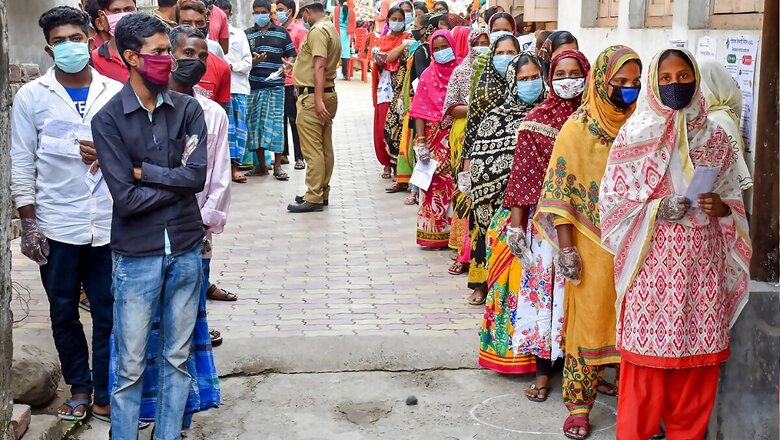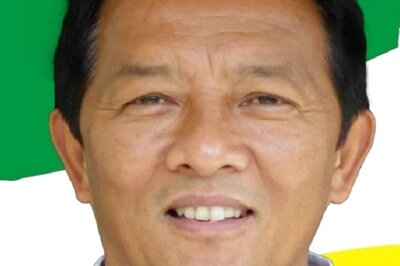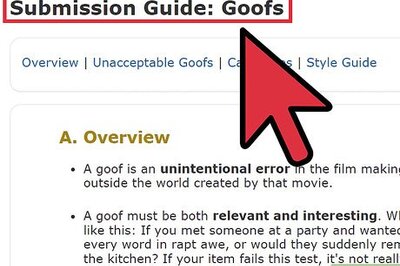
views
The Bharatiya Janata Party (BJP) paid a heavy price for the Citizenship (Amendment) Act and its strong Hindutva push in its bid to seize the reins of West Bengal from Mamata Banerjee’s Trinamool Congress. Anticipating that the state’s 27.01% Muslim vote share, as per the 2011 census, will get scattered among the TMC, Congress, Left and cleric Abbas Siddiqui’s Indian Secular Front, while a majority of the nearly 70% Hindu voters will back the saffron brigade, leaders from the BJP and associated groups started stoking polarisation politics soon after winning 18 of the state’s 42 Lok Sabha seats in 2019. However, the “absurd results”, as described by some state BJP leaders, of the assembly polls declared on May 2 are a fallout of Muslim vote consolidation in most assembly constituencies but mainly in Howrah, and the North and South 24 Parganas.
Following the fiercely fought eight-phase elections, the TMC has returned to power in Bengal with a thumping victory, winning 213 of the 292 seats on offer. The BJP, which ran a high-octane campaign led by Prime Minister Narendra Modi, union home minister Amit Shah and other big leaders, got 77. The Congress and Left drew a blank while the ISF and Gorkha Janmukti Morcha (GJM) got a seat apiece.
There are 16 assembly seats in Howrah, while in the North and South 24 Parganas, there are 33 and 31, respectively. Out of the 80 seats in the three districts, Trinamool bagged 75, with clean sweeps in Howrah and in South 24 Parganas. In North 24 Parganas, the BJP won only five of the 33 constituencies.
Following the destructive cyclone Amphan a year ago, BJP leaders had paid special attention to these three districts and started working on feeding anti-incumbency sentiments with catchy slogans against the TMC for its alleged cut-money (commission) culture and general corruption in the distribution of relief materials among affected people.
Even PM Modi, Shah and BJP national president JP Nadda launched several attacks on Bengal’s ruling party on these issues.
In most rallies and meetings in these districts, top BJP leaders tried to consolidate Hindu voters while highlighting the TMC’s “corrupt practices”.
While addressing the public at the iconic Brigade Parade Ground in Kolkata on March 7, the Prime Minister took a dig at Trinamool while promising “Asol poriborton (real change)”. “Unnayan sabka hoga…tushtikaran kisi ek ka nahi (There will be development and growth for all and not appeasement of one community),” he said.
The BJP’s attempt at polarisation was so prominent that, despite the anti-incumbency factor, Muslims voted for Trinamool in large numbers in these districts with no significant division of vote share.
In South 24 Parganas with almost 37%, in North 24 Parganas about 25% and Howrah with around 40% Muslims voted heavily for the TMC due to the BJP’s CAA and Hindutva push.
The Citizenship Amendment Act aims to fast-track citizenship for Hindus, Parsis, Sikhs, Buddhists, Jains and Christians who arrived in India before December 31, 2014, from Muslim-majority Afghanistan, Bangladesh and Pakistan after facing religious persecution. The passing of the bill on December 11, 2019, triggered widespread demonstrations in several parts of the country, with detractors including the TMC saying, combined with the National Register of Citizens (NRC), the legislation is aimed at stripping Muslims in India of their citizenship if they have insufficient documentation.
Speaking to News18, the BJP’s South 24 Parganas district president Sunip Das said, “The main factor behind the TMC’s surge is Muslim voters. They voted only for the TMC this time. Muslim vote share was not divided between the Congress and Left. Can you believe that in one of the booths in Jaynagar, we got only 27 votes, while TMC was leading with more than 50,000 votes (during counting)? In South 24 Parganas district, the CPI(M) vote share was 7% earlier, but this time it came down to 2% as the rest switched to the TMC. It was a bipolar contest between the TMC and BJP and the ruling party gained a lot, which was beyond our assessment. There was a strong anti-incumbency factor in all these three districts but one community took it as a struggle for existence.”
A similar trend was also witnessed in North Bengal where consolidation of Muslim votes became a major factor behind the TMC’s rise.
BJP sources also said that at least 31 of the candidates who won on its tickets were defectors from other parties.
“A total of 107 candidates (who joined the BJP from other parties) contested the Bengal assembly polls and only 31 managed to win. We never expected such horrible results,” a senior BJP leader said on condition of anonymity.
Read all the Latest News, Breaking News and Coronavirus News here. Follow us on Facebook, Twitter and Telegram.




















Comments
0 comment